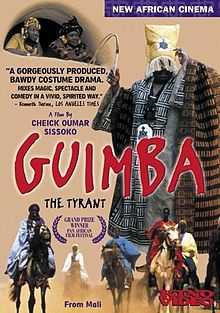Guimba the Tyrant
| Guimba the Tyrant | |
|---|---|
 DVD cover | |
| Directed by | Cheick Oumar Sissoko |
| Produced by |
Idrissa Ouedraogo Sophie Salbot (executive producer) |
| Written by | Cheick Oumar Sissoko |
| Starring |
Fatoumata Coulibaly Habibou Dembele Lamine Diallo Maimouna Hélène Diarra Balla Moussa Keita Cheick Oumar Maiga Mouneissa Maiga Fabola Issa Traoré |
| Music by |
Michel Risse Pierre Sauvageot |
| Cinematography | Lionel Cousin |
| Editing by |
Kahéna Attia Joëlle Dufour |
| Distributed by | Kora Films; California Newsreel |
| Release dates | 1995 |
| Running time | 93 minutes |
| Country |
Mali France Germany |
| Language |
Bambara Fula |
Guimba the Tyrant (French: Guimba, un tyrant, une époque) is a 1995 Malian comedy drama film in the Bambara language (with some Fula language components), directed by noted Malian director Cheick Oumar Sissoko. The movie shows the rise and fall of a cruel and despotic village chief Guimba, and his son Jangine in a fictional village in the Sahel of Mali. Some of the storytelling was done through the medium of the village griot, and with the film being placed in an old setting, lends an epic touch to the movie. The exact chronological setting of the movie is difficult to ascertain, being set in an isolated village, but the commonly used weaponry shown is the blunderbuss. The film depicts some magical components, including a solar eclipse brought on by magic. Casting was only partially done from among professional actors.
The film has well designed, colorful and exotic props, costumes and sets. It has evoked mixed responses from critics, while being lauded for its visual beauty.[1][2] Slapstick comedy is present throughout the movie, as is comedy through the actions of the griot. The screenplay also contains numerous interesting African adages. The movie soundtrack contains music sung in old dialects using ancient instruments.
Some critics have founds elements of political satire in the film, due to director Oumar Sissoko's resistance to Malian dictator Moussa Traoré.[3]
Plot
The film opens with a village griot reciting the story of Guimba the tyrant, of the Dunbuya family. The setting moves to an old Malian village ruled by the evil and tyrannical leader Guimba and his dwarf son Janguine. Janguine has been betrothed from childhood to the village beauty Kani from the Diarra family - the other powerful family in the village. Janguine, however, has his eyes on Kani's well-endowed mother Meya, and hence Guimba offers to marry Kani, asking Kani's father for a divorce so that Janguine can marry Meya. When he refuses, he is banished from the village. Protests break out, leading to the killings, and subjugation.
As the village gets embroiled in a civil war, Kani manages to escape to her father's camp on horseback with Guimba unsuccessfully giving chase. Guimba's slave is also welcomed into the rebel camp. She is dressed up provocatively and sent back to the village, causing both Guimba and Janguine to fall for her. Guimba kills his son over her, and chases her out of the village and into a trap - leading to his downfall.
Awards
- Grand prize, FESPACO (Pan African Film Festival of Ouagadougou) - 1995
Reviews
External links
- Guimba the Tyrant distributed by California Newsreel
- Guimba the Tyrant at the Internet Movie Database